How to Win the New SEO Game: AI Search, GEO, and the Future of Visibility
Dear GTM Strategist,
"How is AI changing SEO - and what should we do about it?"
That’s one of the most frequent questions I hear from founders, marketers, and growth leaders these days. The rules are shifting fast. With ChatGPT, Perplexity, and Gemini shaping how buyers discover, evaluate, and engage with products, traditional SEO isn’t just evolving - it’s being rebuilt from the ground up.
To help us all stay ahead of the curve, I invited Jairo Guerrero, founder of Organic Hackers, to break it down for us. Jairo isn’t just following the trends. His team has helped brands 5x their daily traffic and land in top results of AI search tools, often in less than 24 hours.
In this tactical guest post, Jairo shares:
How to build an SEO strategy for ChatGPT, Perplexity, Google, and beyond
Why content alone isn’t enough - and how to win with distribution and multichannel signals
The framework behind GEO (Generative Engine Optimization) and how to make your brand “token-friendly” to LLMs
Step-by-step actions from a real-world case study that grew both traffic and leads
If you're building a brand today, you need to rank not just on Google. You need to build the authority to rank everywhere.
Now, let’s hear it from Jairo.

This post is sponsored by Ahrefs - a leading SEO & marketing intelligence platform that helps you accelerate the growth of organic traffic to your website.
With Brand Radar by Ahrefs, you can now track your brand’s visibility in AI search in ChatGPT, Perplexity, Google’s AI Overview, and other major chatbots.
After you read this post, I want you to understand:
If you have to invest into AI search
When is the best time to invest in AI search
How to invest into growing in AI search
I will do it using the experience I gained by growing my clients traffic, leads and revenue from search channels:
ChatGPT
Perplexity
Gemini
Etc
You get the point. I want you to understand how to make your brand appear on all search engines or search tools.
How we 5x daily traffic of a +50M tech businessLet me pick up this particular case study:
I grew 5x daily organic traffic of a +50M tech company
I have been doing SEO for over a decade. Now with the rise of AI search tools (i.e. ChatGPT) we also offer specific approaches to our clients to appear on all new search tools. I want to show you how it’s done with examples.
We started working on this case study in April 2024. This is how it is going:
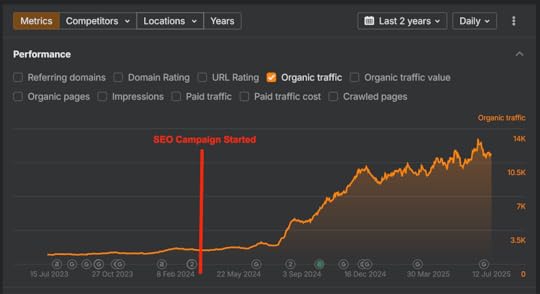
Daily leads on this website grew by 30% too. Traffic is cool, leads and customers are cooler.
We managed to appear on major AI search engines (Search GPT, Perplexity, etc.), including AI Overviews, which picked up our content #1 in less than 24 hours:
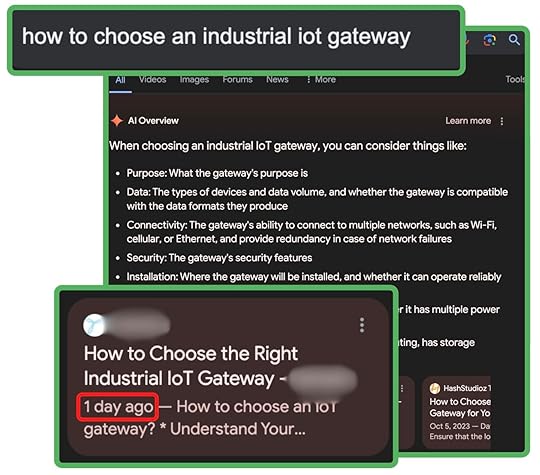 Example of how fast you can rank on AI Overviews
Example of how fast you can rank on AI OverviewsSEO has evolved and has become the base for a new marketing approach:
Generative Engine Optimization (GEO) which targets not only regular search engines but also AI tools as a marketing channel
You will find references to this new approach as AEO: Answer Engine Optimization, as in optimizing your content so it becomes an answer in AI search tools or LLMs.
Long story short, we are all working on setting the pillars of what SEO will be in the upcoming 10 years, so do not be surprised to find yet another acronym like LLMo, LEO, AiO, etc.
Even the actual meaning of the acronym is evolving from Search Engine Optimization to Search Everywhere Optimization, meaning you need to be found with content across different platforms and formats.
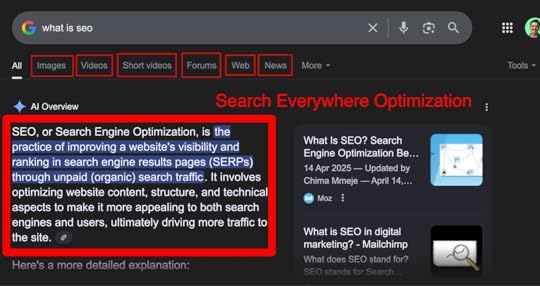 New meaning of SEO: Search Everywhere Optimization - be found on any platform in any format
New meaning of SEO: Search Everywhere Optimization - be found on any platform in any formatToday, rankings and mentions (in Search GPT, for example) are the core focus in terms of KPIs. Traffic altogether is decreasing because the search tools just summarize and compound all results, so the user has to browse a little less.
Note: We have seen that eCommerce still remains with good traffic growth.
Traffic has become a much less relevant metric. Rankings and mentions have instead taken a much stronger position. If you do not rank nor get mentioned, you will hardly thrive as a business or organization.
Lower traffic does not mean less customers in a 1-to-1 ratio. But lower rankings and fewer mentions is what actually affects your business. If search engines and search tools do not even consider your website, there is 0% chance you will get a visitor or a customer.
If you want to rank and get mentioned, you still need to invest in SEO.
In this case study, I will explain how I helped multiple clients to achieve:
5x Daily traffic and higher rankings on all search engines
Top Google positions
Top AI Overviews
Top GPT Search
More leads
More revenue
Ready? Let’s go…
1) SEO in the AI era (GEO, AEO)AI is used mostly to create content, which is a basic use of the technology.
The real use of AI in marketing is not creating content.
AI is a new marketing channel.
SEO/GEO is the method to appear on the new AI Search Engines.
 SearchGPT and other AI search engines made the SEO market bigger
SearchGPT and other AI search engines made the SEO market bigger“We need to create 1000s of articles and pages”... you might be thinking.
No, you do not need to create much content.
We experienced significant growth after writing a few blog articles.
The truth is, you cannot treat “search” as an isolated marketing channel anymore. You might not need to create 1000s of pages, but one thing is true:
SEO has evolved with AI to become a multichannel approach
Let me explain why SEO (GEO/AEO) is a multichannel approach.
2) AI Search as a multichannel approachI'll always reference SEO as the science behind the entire search market. So, let me explain why and how SEO went truly multichannel.
To grasp this multichannel approach, we need to understand a core concept: Tokenization.

In simple terms, Tokenization is how LLMs (what we call AI) process language. Imagine an LLM's vocabulary is the entire internet. To 'understand' and store all those webpages, words are 'tokenized.' This means they're compressed into a much more efficient format the system can actually handle.
Once tokenized, the LLM then builds semantic understanding and contextual relationships between these 'words'. It operates on statistics: predicting which word is most relevant and 'statistically accurate' to put next. The core output is the probability of a word appearing within a specific context.
Semantics and context are a crucial detail for our marketing game. You see, if your brand is mentioned frequently and consistently across the internet, it becomes statistically more likely for LLMs to include it in their responses.
It's not a new strategy, it is “simple” positioning. Repeating what your brand and organization do, everywhere: podcasts, YouTube, social media, news sites, etc. has become more critical than ever.
To win on AI engines, a multichannel approach is fundamental.
3) How to win AI search - 5 Practical StepsCool message you want to receive from an old client:
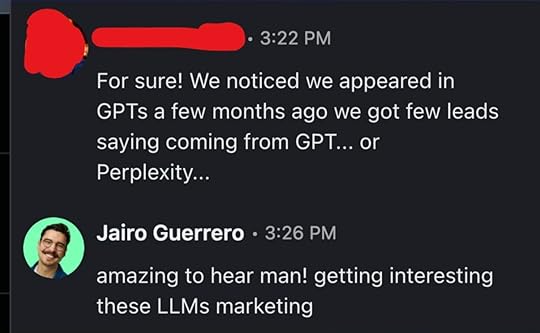
This eLearning business was getting leads from Perplexity and ChatGPT.
Never forget, the ultimate goal of your search strategy has to align with your business goals.
3.1 - Setup the “ai search market” strategyIt is fundamental to start with your ICP (Ideal Client Profile). Any data you can gather from them will serve to narrow down your content strategy.
The ICP definition study is a full understanding and alignment of:
Vision and mission
Your business goals
Your target audience
Audience pain points
How you solve your audience’s pain points
How to translate everything into an AI search content strategy
What you should doFor the case study, I run the ICP definition study like this:
Video meeting with the team: C-level, sales team and customer support team.
Video meetings with end clients.
Analyze every single aspect of the call.
Analyze all business data:
Survey’s data
Google ads
Brand book
Products
Sales calls
Decks
Anything that gives me information about the business.
This analysis is translated into The ICP Definition Analysis documentation which I use during the whole SEO campaign.
Now with AI you can use your entire organization’s data and create fantastic ICP documentation which can be used for every single marketing channel. I use it primarily for SEO/GEO.
 Example of The ICP Definition Study of a Tech Brand - touching all business aspects to translate them into SEO content
Example of The ICP Definition Study of a Tech Brand - touching all business aspects to translate them into SEO contentOnce the ICP is clear, doing content research is a lot easier. I aimed for +20k keywords in this project, yet I do think regular 5k-size keyword lists are more than enough for 90% of the cases:
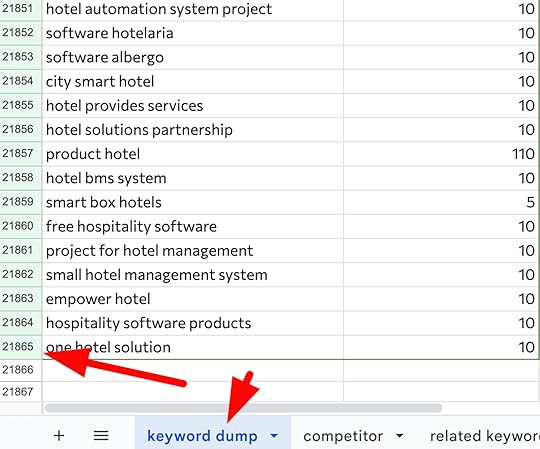 Example of keywords found that fit the ICP3.2 - Technical SEO
Example of keywords found that fit the ICP3.2 - Technical SEOIf everything is done by AI, is technical SEO dead?
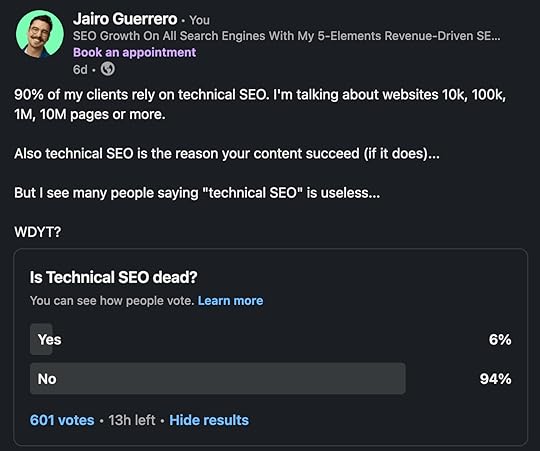 According to a LinkedIn Survey I did, technical SEO is not dead
According to a LinkedIn Survey I did, technical SEO is not deadAnd the sentiment across the industry is that technical SEO roles are even more crucial to have in your team…
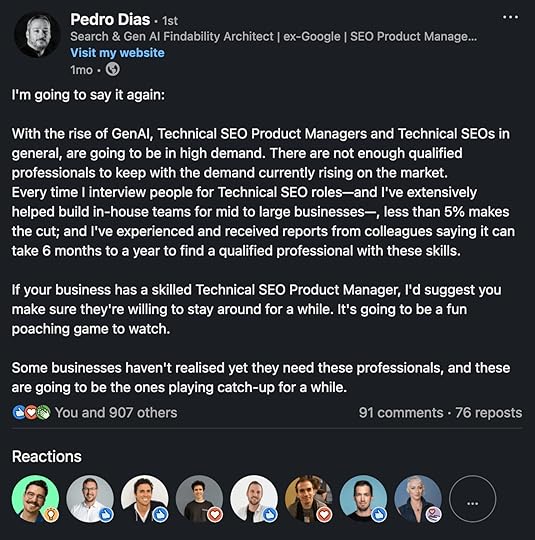 Pedro Dias’ post about technical SEO
Pedro Dias’ post about technical SEOI will make it easier for you this time. If you are a startup or your website is rather small, the chances you have to focus on technical SEO are low. Technical SEO has the most impact on bigger websites. That being said, you still have to make sure some basics are covered.
Without getting too technical, websites are still crawled (read) by machines.
What you should doEnsure your website is flawlessly functional and easy for AI to read. This means perfect crawlability, precise structured data (Schema), and avoiding rendering issues (like heavy JavaScript) that make your site invisible to AI.
Technical SEO actions I took for this case study:
Internal links from blogs to product pages (as a “recommended pages” block), it was implemented in every single page, so the impact was significant. Internal links create a solid website structure which helps the most important content to be discovered and ranked.
Removed all JavaScript-rendered content: my client had navigation and on-page content rendered with JavaScript. JavaScript rendering is not plain text. If the text is loaded with JavaScript, it won’t be visible for crawlers.
A few more technical tasks for website performance were executed, but it was not so much for SEO purposes but for usability.
This AI search case was for a B2B business. In general, for B2C or D2C websites, the technical upgrades alone might be longer to explain than this very article.
For now, structured data is not reported to be used as much by ChatGPT as much as by Google. Yet, in the upcoming years, I believe LLMs will use more Schema, especially with the rise of AI e-commerce.
Structured data is accurate data provided by websites that can be used for search results. Things like prices or product titles cannot be left to an LLM’s interpretation. Currently, RAG solves the problem of having accurate data, but I will leave that topic for another time.
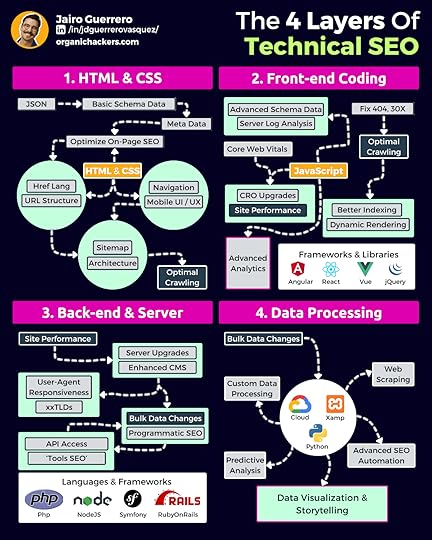 3.3 - Content Distribution: Backlinks & Digital PR
3.3 - Content Distribution: Backlinks & Digital PRYou can rank #1 on Google or appear in top mentions in ChatGPT by being present on other major websites.
Let’s say you are building a CRM. People will prompt things like “best crm software”. The first organic results are an opportunity for you. Reach out to those websites, build a relationship, and try to get them to talk about your brand. It is not easy, but super effective as you will be #1 in ‘no time’.
What you should doThere are many ways to improve your online footprint:
Social media: more of this in the next point
Backlinks: other websites talking about you
Digital PR: appear in the news
Industry events: be present
Podcasts: of course
Awards: win stuff
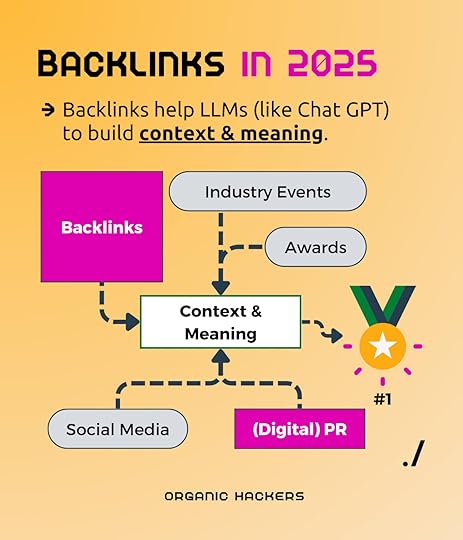 How backlinks help you to be ranked on search engines
How backlinks help you to be ranked on search enginesMy client was very present on:
international business fairs
cooperated heavily with magazines
their LinkedIn page had +15k followers at the time
My client was very good at getting noticed within their niche. What I did was translate that into the search market.
Get your brand mentioned by other trusted websites through traditional backlinks and strategic digital PR in news outlets. Even without direct links, these widespread, authoritative mentions get "tokenized" by AI, adding significant contextual value.
Expert-Commentary backlinksOne of the best methods to “create context” is you appearing as a specialist on the matter. Here is an example of an article that quotes me on the topic of AI search and technical SEO:
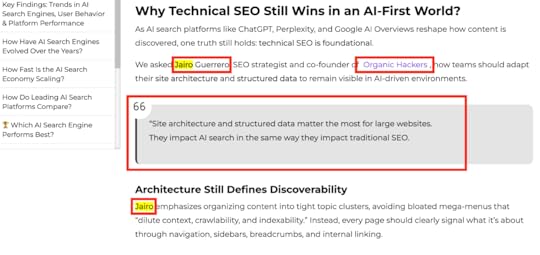 Example of expert commentary type of backlink to create context
Example of expert commentary type of backlink to create contextBut first, you need to be considered an “expert”. And the way to do that opens up the next point: social media.
3.4 - Social Media ActivityBe consistently active on social platforms like LinkedIn (frequently quoted by AI) and Instagram (content now crawled by Google). This boosts immediate results, exposure, authority, and your overall online footprint for AI search.
What you should doIf you are a founder in the B2B space, you have to master LinkedIn. The priority of any founder is to get their business to the top, and LinkedIn is the platform to do so.
Better yet, the content of LinkedIn is crawled by search engines, and it is quoted often in AI Overviews and ChatGPT.
One of the biggest creators on LinkedIn, Jasmin Alić, mentioned the power of LinkedIn on search engines.
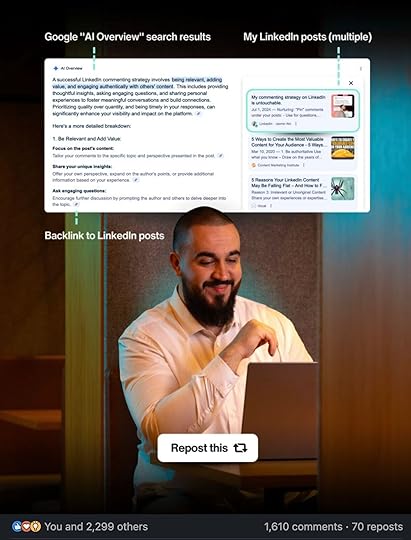 Jasmin Alić’s view on LinkedIn + SEO
Jasmin Alić’s view on LinkedIn + SEOI ran a GEO experiment to see if Google or ChatGPT would quote my LinkedIn post on the topic “give me b2b seo niches”. I wanted to appear for such a query as I could get leads from those searches. But my main goal is to test.
I posted on LinkedIn and I checked the next day. I prompted ChatGPT, Perplexity and Google: "give me b2b seo niches". All 3 of them were quoting my LinkedIn Post
Benefits of LinkedIn + SEO/GEO:Posting on LinkedIn populates to the search market
My post got more than 10k impressions
Top rankings in all search engines
A bit over 100 email subscribers
 Google ranked my LinkedIn post
Google ranked my LinkedIn post
 ChatGPT quoted my LinkedIn post
ChatGPT quoted my LinkedIn postI post 4-6 times per week. My entire business is based on the leads I get from LinkedIn. I am looking to expand my channels but the B2B platform without a doubt is LinkedIn.
Thanks to LinkedIn, I have been invited to podcasts, to events and I am mentioned on different websites as an expert. All of this improves the online footprint that will allow me to rank on all search engines on easy mode.
3.5 - On-Page & Content StructureOptimize your website content for AI's "chunk-level retrieval." Include clear headings, concise paragraphs focused on single ideas, and comprehensive topical coverage to make information easily digestible and quotable by AI.
What you should doAleyda Solis created a great (amazing) resource on site optimization for AI search.
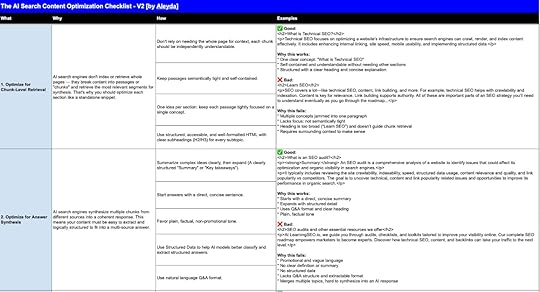 Aleyda’s checklist on AI Search content optimization
Aleyda’s checklist on AI Search content optimizationHere are the core 3 aspects of on-page optimization to win AI search visibility:
1. Chunk-Level Retrieval
Content is retrieved in chunks/passages, not whole pages. Each chunk must be:
Self-contained
Focused on one idea
Semantically tight
Structured with clear headings (H2/H3)
HTML formatted and accessible
2. Answer Synthesis Optimization
AI combines content from multiple sources.
Start with concise, direct summaries
Use plain, factual language
Avoid promotional tone
Add structured data
Use natural Q&A format
3. Citation-Worthiness
Only trustworthy, clear content gets cited.
Signals for citation:
Specific, verifiable claims
Sources and links to authoritative references
Author and credentials (EEAT)
Updated timestamps
Author and organization schema
Do not forget to add value. Do not write what everybody else does. Add a different perspective. My client, for example, focused on their +20 years as a manufacturer to add real-field value into the content. LLMs love added value that cannot be found anywhere else:
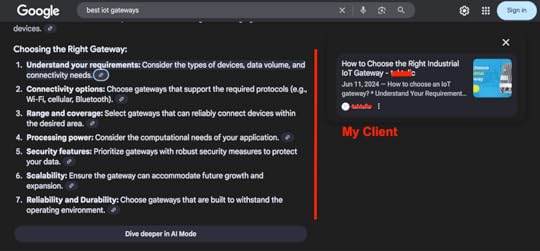 Example of content optimization delivering top rankings on AI OverviewsBonus - Community SEO
Example of content optimization delivering top rankings on AI OverviewsBonus - Community SEOReddit. Where everybody goes to talk about everything without filters. First-hand experience of peers with similar struggles and interests. Plus, all that content is crawled and indexed and quoted by AI Overviews.
What you should doGet active on Reddit and master that platform
Create your own Reddit: create a forum around your product, let your customers talk about stuff, allow crawlers to index it and rank it. Win.
One of the best cases is Shopify. They built a forum for all Shopify users, so they are the first source search engines will show to users for most things Shopify-related.
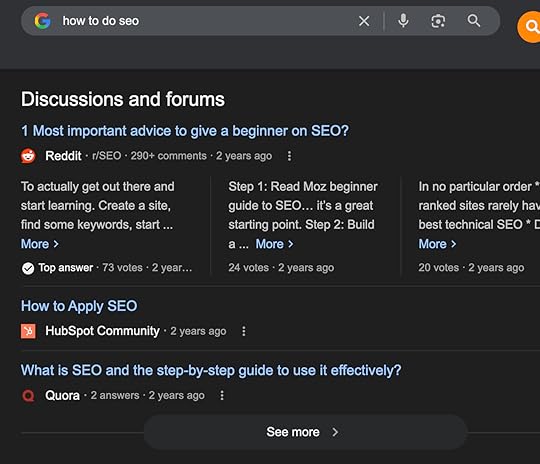 Example of a featured section of forums in the search results
Example of a featured section of forums in the search resultsReady for SEO growth across all search engines? Go to organichackers.com
If you enjoyed this content, I got some more for you here: https://www.linkedin.com/in/jdguerrerovasquez/

Get the best-selling GTM Strategist book + 20 frameworks (workshops) + online course.
Leverage the 100-step GTM Checklist with AI prompts tested on 800+ launches with templates (emails, launch plans, posts, landing pages), which will guide you from getting ready to launch to an impactful launch and scaling stage.
Guide your team to successfully choose ICP (target market), pricing, positioning & selection of best GTM Motion (channels, tactics) with GTM Masterclass - includes 6 hours of video content.
Thanks for reading GTM Strategist! Subscribe for free to receive new posts and support my work.



